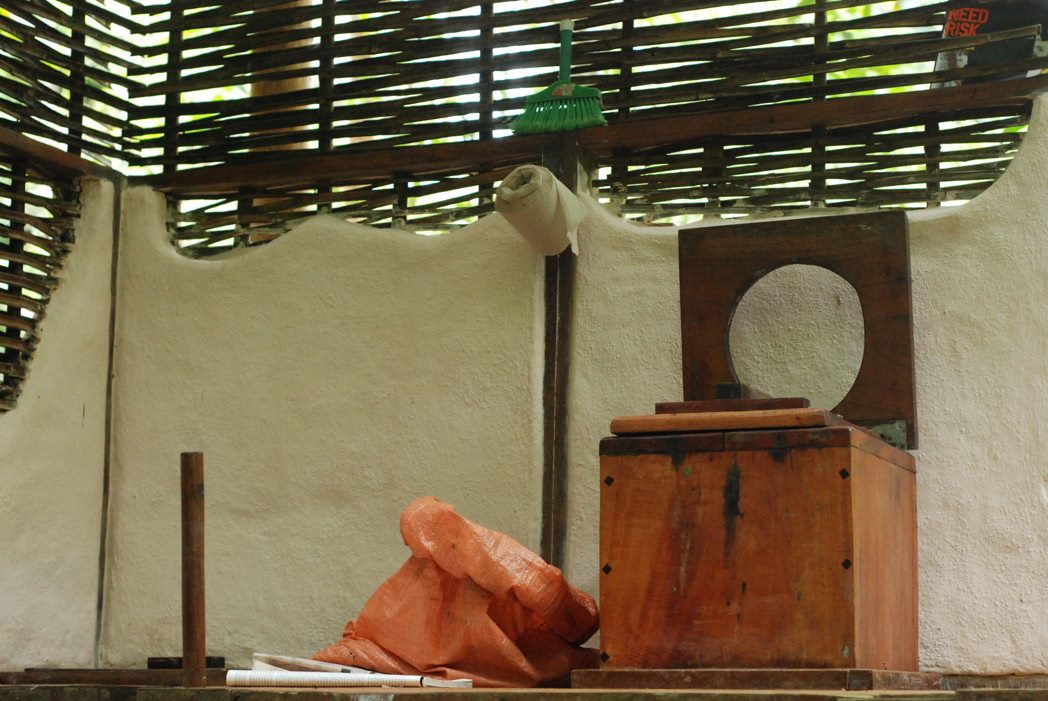By Tim O'Hara
Poop. Shit. Mierda. Caca. Crap. Boñiga. Excrement. Feces. Dung. There are countless ways to say what comes out of an animal’s body as solid waste. As most visitors to the Ranch realize soon after their arrival to Mastatal, we talk about poop more than the average learning center or household, and it’s not uncommon for it to be the center of a meal conversation.
Human beings’ evolution towards “fecophobia”, or a fear of fecal matter, has been steady and consistent over the past few decades. The reasons behind this observation have at times been warranted, but not always. One of our goals as an organization is to initiate honest and open conversations about controversial topics related to sustainability, including how best to manage animal waste. As a child, I was taught to avoid poop at all costs. Poop was meant to be flushed away to some unknown, unasked about destination far from my house. Pull the lever on the porcelain throne and think no more about it. My closest encounters with poop growing up mostly consisted of scraping dog shit from the bottom of my sneaker with a stick after a game in the yard. This type of experience only increased any justification for not being endeared to this smelly, dangerous, and sticky substance. Nevertheless, most of us spend part of the first years of our life walking around with a load of it in our diapers, which may help to explain why my relationship with poop has oftentimes been defined by confusion. Everybody poops. That’s also the title of a book that a friend gave to our daughter Soledad when she turned 1. This wonderful little read is the author’s effort to encourage listeners and readers to start to develop a more comfortable association with an undertaking that we all partake in every day.
Since the years of my youth, I’ve grown more comfortable with the process of defecating. I have come to see what I used to see as waste and gross as not only a normal part of nature but a potentially valuable resource. As a Peace Corps volunteer in Uruguay in the early nineties working with organic farmers, I saw how animal manures made up an important part of the soil fertility building techniques employed by the food growers that I worked with on a daily basis. Years later upon arriving to Mastatal I was convinced that one of our first projects should be to construct a composting toilet that would turn our and our guests' body waste into usable fertilizer for our orchards. We thought that this would be a good alternative to the infrastructure that I grew up with in New York State that utilized drinking water to transport my family’s poop to some unseen (but not unsmelled) place to be treated with chemicals.
Fifteen years later we have eight composting toilets scattered around our campus. From our forays into natural building we successfully experimented with using manures in the plasters that now protect and beautify our buildings. Around 2005 we learned from a Costa Rican friend, an organic coffee farmer outside of Puriscal, about using animal waste to produce cooking gas. Shortly after hearing about this possibility the Ranch built its first methane digester that has helped us reduce our dependence on imported fossil fuel based cooking fuels. We also learned from a Ranch guest that you could raise a child without diapers and soon before Sole’s birth Robin and I decided to give that “radical” idea a try. Humans today that spend their first years in diapers contribute an average of 2 tons of feces filled diaper garbage to their local dumps. Diapers reportedly make up about 4% of landfill volume. When I read these figures for the first time I had to take a step back and think whether it could possibly make sense to contribute to this reality while allowing my child to walk around with a pile of crap in her drawers. The more I thought about it, and the more I researched the alternatives, the more I decided that diapers were yet another co-opted, environmentally destructive, profit driven invention that has been forced down the throats of almost every developed and many developing world families as the only civil and rational way to raise your baby. The vast majority of diapers are expensive, non-biodegradable, and in many cases, unnecessary. I concede that raising your child diaper free is not for everyone, but I am convinced that it could be an option for many more families if they understood the process and the benefits of this mode of child rearing.
Animal feces, if handled irresponsibly, can and does make people sick. Millions of children in Africa and other parts of the developing world die each year from diarrhea caused by poor sanitation and water contaminated by animal waste. These are serious issues that need to be addressed in responsible ways so that children do not die avoidable deaths. I am not condoning that we we live in a world where crap runs down sidewalks and flows untreated into our rivers. What I’m hoping for is that humans can develop a healthier understanding about both the benefits and shortcomings of animal waste and as a result promote rational and sustainable techniques, policies and ideas that allow us to relate with poop in ways that maximize its advantages and minimize its risks.
At Rancho Mastatal we think and talk a lot about our impact. We look for ways to build using local and natural resources, produce our own energy, improve our community’s health, save money and ameliorate the fertility of our soils. The sustainable solutions to all of these goals are in part hidden in the dark, rich world of animal poop, and when handled responsibly and intelligently provide answers to how humans can start shifting, and shitting, towards a more healthy relationship with our bodies and our planet.
NEWS AND NOTES
The busy season has come to an end, the last of our groups for the fiscal year have come and gone. Our Apprentice Crew has all but taken over running the Ranch. It is a time for projects, practice, rest, reflection, and beginning to prepare for 2017.
One of our favorite ways to reflect is looking back over old photos. Want to explore the Ranch's past with us? Check us out on Flickr and let us know your favorite pics!
Abrazos
The Ranch Crew






